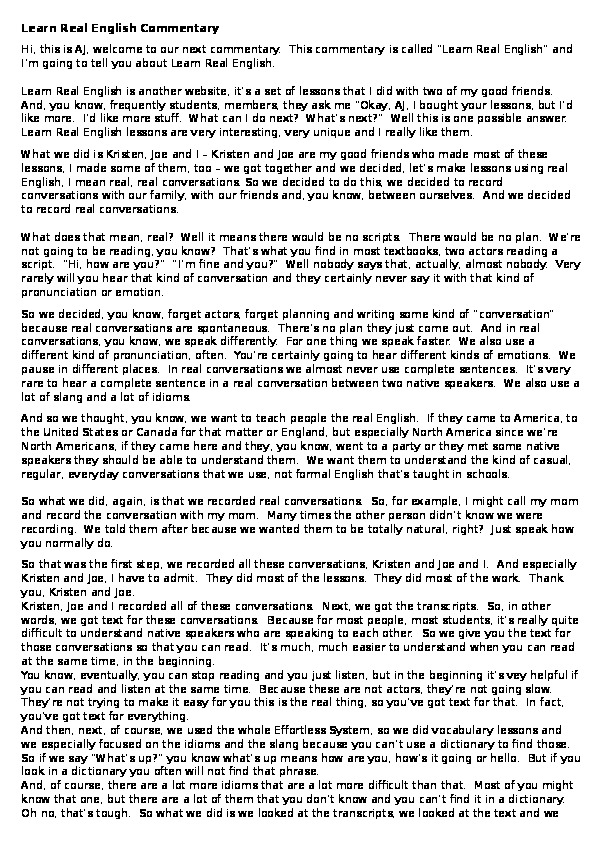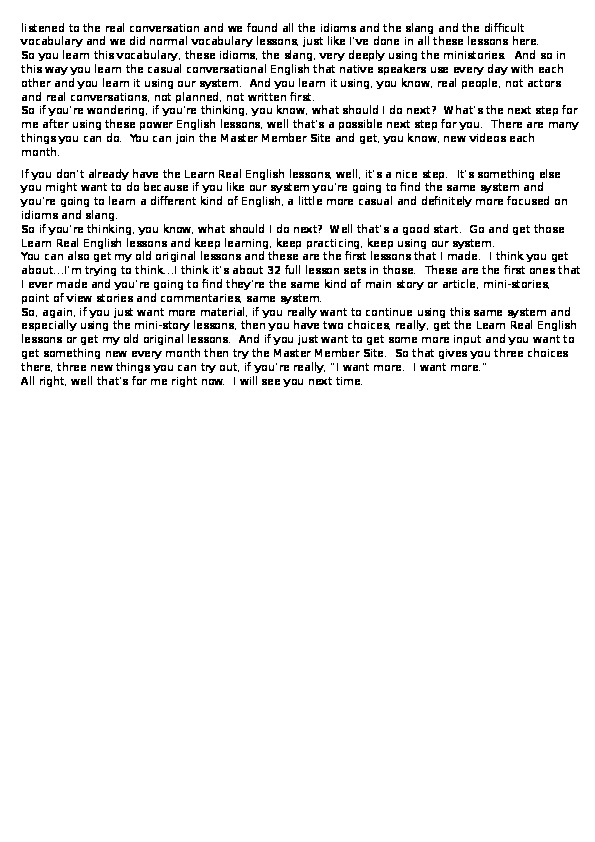Hi, this is AJ, welcome to our next commentary. This commentary is called “Learn Real English” and I’m going to tell you about Learn Real English.
Learn Real English is another website, it’s a set of lessons that I did with two of my good friends. And, you know, frequently students, members, they ask me “Okay, AJ, I bought your lessons, but I’d like more. I’d like more stuff. What can I do next? What’s next?” Well this is one possible answer. Learn Real English lessons are very interesting, very unique and I really like them.
What we did is Kristen, Joe and I – Kristen and Joe are my good friends who made most of these lessons, I made some of them, too – we got together and we decided, let’s make lessons using real English, I mean real, real conversations. So we decided to do this, we decided to record conversations with our family, with our friends and, you know, between ourselves. And we decided to record real conversations.
Learn Real English Commentary
Hi, this is AJ, welcome to our next commentary. This commentary is called “Learn Real English” and
I’m going to tell you about Learn Real English.
Learn Real English is another website, it’s a set of lessons that I did with two of my good friends.
And, you know, frequently students, members, they ask me “Okay, AJ, I bought your lessons, but I’d
like more. I’d like more stuff. What can I do next? What’s next?” Well this is one possible answer.
Learn Real English lessons are very interesting, very unique and I really like them.
What we did is Kristen, Joe and I – Kristen and Joe are my good friends who made most of these
lessons, I made some of them, too – we got together and we decided, let’s make lessons using real
English, I mean real, real conversations. So we decided to do this, we decided to record
conversations with our family, with our friends and, you know, between ourselves. And we decided
to record real conversations.
What does that mean, real? Well it means there would be no scripts. There would be no plan. We’re
not going to be reading, you know? That’s what you find in most textbooks, two actors reading a
script. “Hi, how are you?” “I’m fine and you?” Well nobody says that, actually, almost nobody. Very
rarely will you hear that kind of conversation and they certainly never say it with that kind of
pronunciation or emotion.
So we decided, you know, forget actors, forget planning and writing some kind of “conversation”
because real conversations are spontaneous. There’s no plan they just come out. And in real
conversations, you know, we speak differently. For one thing we speak faster. We also use a
different kind of pronunciation, often. You’re certainly going to hear different kinds of emotions. We
pause in different places. In real conversations we almost never use complete sentences. It’s very
rare to hear a complete sentence in a real conversation between two native speakers. We also use a
lot of slang and a lot of idioms.
And so we thought, you know, we want to teach people the real English. If they came to America, to
the United States or Canada for that matter or England, but especially North America since we’re
North Americans, if they came here and they, you know, went to a party or they met some native
speakers they should be able to understand them. We want them to understand the kind of casual,
regular, everyday conversations that we use, not formal English that’s taught in schools.
So what we did, again, is that we recorded real conversations. So, for example, I might call my mom
and record the conversation with my mom. Many times the other person didn’t know we were
recording. We told them after because we wanted them to be totally natural, right? Just speak how
you normally do.
So that was the first step, we recorded all these conversations, Kristen and Joe and I. And especially
Kristen and Joe, I have to admit. They did most of the lessons. They did most of the work. Thank
you, Kristen and Joe.
Kristen, Joe and I recorded all of these conversations. Next, we got the transcripts. So, in other
words, we got text for these conversations. Because for most people, most students, it’s really quite
difficult to understand native speakers who are speaking to each other. So we give you the text for
those conversations so that you can read. It’s much, much easier to understand when you can read
at the same time, in the beginning.
You know, eventually, you can stop reading and you just listen, but in the beginning it’s vey helpful if
you can read and listen at the same time. Because these are not actors, they’re not going slow.
They’re not trying to make it easy for you this is the real thing, so you’ve got text for that. In fact,
you’ve got text for everything.
And then, next, of course, we used the whole Effortless System, so we did vocabulary lessons and
we especially focused on the idioms and the slang because you can’t use a dictionary to find those.
So if we say “What’s up?” you know what’s up means how are you, how’s it going or hello. But if you
look in a dictionary you often will not find that phrase.
And, of course, there are a lot more idioms that are a lot more difficult than that. Most of you might
know that one, but there are a lot of them that you don’t know and you can’t find it in a dictionary.
Oh no, that’s tough. So what we did is we looked at the transcripts, we looked at the text and welistened to the real conversation and we found all the idioms and the slang and the difficult
vocabulary and we did normal vocabulary lessons, just like I’ve done in all these lessons here.
So you learn this vocabulary, these idioms, the slang, very deeply using the ministories. And so in
this way you learn the casual conversational English that native speakers use every day with each
other and you learn it using our system. And you learn it using, you know, real people, not actors
and real conversations, not planned, not written first.
So if you’re wondering, if you’re thinking, you know, what should I do next? What’s the next step for
me after using these power English lessons, well that’s a possible next step for you. There are many
things you can do. You can join the Master Member Site and get, you know, new videos each
month.
If you don’t already have the Learn Real English lessons, well, it’s a nice step. It’s something else
you might want to do because if you like our system you’re going to find the same system and
you’re going to learn a different kind of English, a little more casual and definitely more focused on
idioms and slang.
So if you’re thinking, you know, what should I do next? Well that’s a good start. Go and get those
Learn Real English lessons and keep learning, keep practicing, keep using our system.
You can also get my old original lessons and these are the first lessons that I made. I think you get
about…I’m trying to think…I think it’s about 32 full lesson sets in those. These are the first ones that
I ever made and you’re going to find they’re the same kind of main story or article, mini-stories,
point of view stories and commentaries, same system.
So, again, if you just want more material, if you really want to continue using this same system and
especially using the mini-story lessons, then you have two choices, really, get the Learn Real English
lessons or get my old original lessons. And if you just want to get some more input and you want to
get something new every month then try the Master Member Site. So that gives you three choices
there, three new things you can try out, if you’re really, “I want more. I want more.”
All right, well that’s for me right now. I will see you next time.


